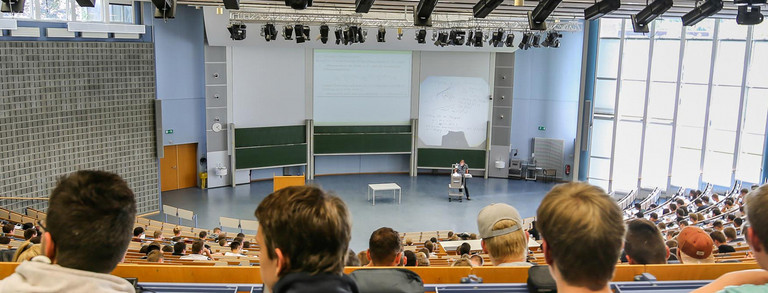TU Students Teach Over 700 People About Digital Media
- Top News
- Studying & Teaching at TU Dortmund University

The internet plays a central role in many people’s everyday lives – whether when looking for a new job or an apartment, for shopping or for staying in touch with friends. As far as social participation is concerned, knowing how to use the internet and what threats or benefits digital media present are becoming increasingly important. That is why the European “All Digital Week” campaign has set itself the task of reaching out to precisely those people affected by digital exclusion and bringing them on board. The campaign also includes events aimed at preventing and raising awareness of threats on the internet such as misinformation and bullying.
“Get Online Week” is part of the above-mentioned European campaign and has been organized by TU Dortmund University as an annual teaching-learning project at the Department of Rehabilitation Sciences since 2015. Under the guidance of Dr. Bastian Pelka and in collaboration with the Social Research Center Dortmund, Bachelor’s students of the Rehabilitation Pedagogy degree program design their own workshops on internet topics, with the aim of fostering participants’ digital skills in the long term and in this way mitigating exclusion. Workshop topics include dealing with digital threats such as fake profiles and bullying as well as strategies for finding accommodation or jobs on the internet. At German Digital Day in 2022, the project received the audience award in the “Digital Participation” category. In 2025, the students held 44 courses in 20 institutions in Dortmund and attracted over 700 attendees for the first time. This increase represents almost double the annual number of around 400 participants.
Workshops aim to strengthen the digital skills of children and adults
The courses on prevention in the digital world took place in schools, leisure and residential facilities, and sheltered workshops. They covered four topics: In the course on cyberbullying, students taught schoolchildren how to recognize and deal with cyberbullying. In a second course, which focused on sexual violence on the internet, professionals working in education learned how to create trust and support children and young people more effectively in this sensitive area. In a third workshop, dedicated to beauty ideals on social media, school students were encouraged to take a critical view of these ideals and their effects. In a fourth course, which centered on sensitive content, parents learned about the various types of harmful content, for example depictions of violence or suicide, that children can be confronted with on social media and how they can protect their children. At the end of “Get Online Week”, the students evaluated the courses and documented their findings in a scientific report.
The next edition of “Get Online Week” will take place in April 2026, again under the leadership of Dr. Bastian Pelka from the Department of Rehabilitation Sciences.
More informationen about the project week
Contact for queries:





![[Translate to English:] Partner Four hands are holding the green logo of TU Dortmund University](/storages/tu_website/_processed_/1/d/csm_Partner_Nicole_Rechmann_KW_670eba0154.jpg)




![[Translate to English:] Forschung An apparatus with tubes in a laboratory](/storages/tu_website/_processed_/0/c/csm_Forschung_Juergen_Huhn_4fa3153b51.jpg)
![[Translate to English:] Studium Five students are sitting in a lecture hall. They are talking to each other.](/storages/tu_website/_processed_/c/9/csm_Studium_FelixSchmale_dbdbfb0dd7.jpg)






